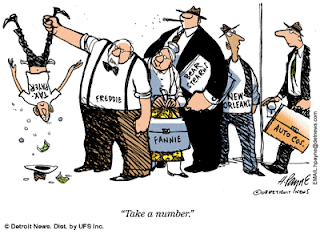
The financial markets responded negatively last Tuesday to the efforts of Treasury Secretary Tim Geithner and President Barack Obama to rescue the economy of the United States, and in particular, the banking sector. What a crisis!
Not satisfied at having sabotaged the world economy with their excesses, we have Wall Street speculators who have now begun to turn up their noses at the measures of help designed to ease [the burden] on certain victims of the crisis, and particularly to prevent it from becoming worse.
It’s the plan for stabilizing and reviving the financial system presented by the state treasury secretary that the critics have especially targeted. The reconstruction project had been too complex and its measures essentially too vague…
Not looking to compromise, this attack is nothing but a tactless excuse for masking so much frustration of a [group] that has come to dominate the game and dictate the rules towards its advantage.
The truth is that one waits for another Republican overture, but the new team in the White House has come to break up the party. The Democrats this time have acted so that the managers cannot dig as they wish into public monies in order to bail out financial institutions that they themselves brought to the brink of collapse.
Obama and Geithner have begun to put things into place. They have, in effect, put together a series of measures to ensure that leaders of these institutions [and their actions] will be much more transparent with their use of the bailout money.
It is necessary to save the banks because they are essential to a quick turnaround. But all will not be saved. The managers must show that their businesses are viable before they receive a dime. No need to invest in lost causes.
The hour has come for them to surrender their books. Thus, the CEOs of the largest American banks – Goldman Sachs, Morgan Stanley, Citigroup, Bank of America, JPMorgan, Wells Fargo, State Street and New York Mellon – went in front of members of a hostile Congress to explain their roles in what led up to this scandal, while the crisis lies at our doorstep.
Numerous examples explain the prevailing bad mood.
Some $18 billion was given out in bonuses to the employees of Wall Street firms. Conferences were set up in grand places like Las Vegas. A plan of acquisition to acquire a luxury business jet, a small party costing $10 million was put on for the friends of the bank and its senior employees under the guise of a marketing operation. But one must ask: What planet do you live on?
While you drive yourself around in a sports car or limousine, enter golf clubs, villa and an office on the 40th floor, make reservations in chic restaurants and boutiques, remember that your fellow citizens are losing their homes because the companies that employ them have closed because of the voracity of your business decisions.
Loss of Confidence
It’s their own fault that the financiers have lost public confidence and that of the government. At the opposite end of the scare, Barack Obama enjoys wide support that allows him to put the system back in order himself.
The recession that these speculators have created has thus given an occasion for them to be disciplined, supervised tightly and for systems of stricter oversight to be put into place.
If one must find an upside to the crisis, this is it.

Leave a Reply
You must be logged in to post a comment.